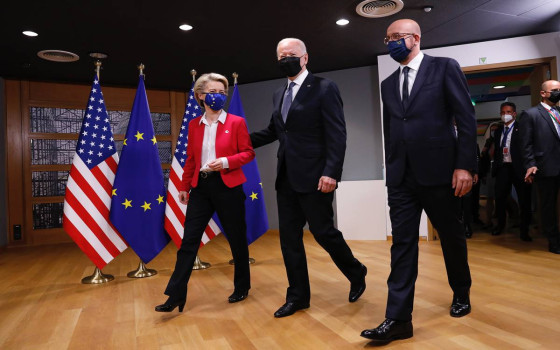
Following the joint European-American-British statement on global food security.. Brussels allocates 8 billion euros and calls on the G20 summit to address the dire consequences of the war in Ukraine

- Europe and Arabs
- Tuesday , 15 November 2022 16:29 PM GMT
Brussels: Europe and the Arabs
After the European Commission in Brussels, which is the executive organ of the European Union, stressed the need to end the unjustified war in Ukraine, it said through a speech delivered by Ursula von der Leyen, the President of the Commission, before the G20 summit that the G20 must now work together to address the dire global consequences of the war. "Let me make two points:
First, the food crisis.
The EU is doing its best to de-escalate the situation:
Just to set things straight again. There are no penalties for agricultural food products and fertilizers.
We strongly support the Black Sea Grain Initiative mediated by Secretary General Guterres and President Erdogan. Needs to be extended.
In addition, in the European Union we have created alternative transport routes for bringing agro-food products from Ukraine, which we call Solidarity Lanes. Since May, more than 15 million tons have been exported through these routes and we are working to increase their capacity.
And we are increasing our aid for global food security by another €210 million, so we are mobilizing up to €8 billion over the next three years for food assistance and to increase domestic food production.
For fertilizers, which of course include ammonia, we facilitate access and movement of fertilizers and provide financial support. In addition, we are working with African and Caribbean Pacific nations on innovation to develop the next generation of fertilizers.
Secondly, the energy crisis.
In terms of energy, Russia's war has been a magnet for the European Union. We literally see that Russia - rather than selling gas - prefers to light the gas.
This narrows the global energy market and causes prices to skyrocket.
We therefore support the introduction of a cap on oil prices. This will greatly benefit low- and middle-income countries
The best response to this is to accelerate the green transition towards clean energy. Clean energy is the only solution to both the energy crisis and the climate crisis.
And there are huge global opportunities in this as well. In the next five years alone, Europe will invest at least €4 billion in renewable energy, such as hydrogen, through our Global Gateway investment strategy. This will unleash massive private investment as well.
All of this shows how relevant the G-20 is to addressing these global issues. This came after a joint European, American and British statement on global food security was distributed in Brussels, in which it stated:
The world faces acute food and nutrition challenges. Conflict, climate change and the lasting effects of COVID-19 are having devastating effects on local and global food systems and the people who depend on them. Russia's unprovoked aggression against Ukraine has exponentially exacerbated these challenges and vulnerabilities.
The European Union, the United States of America and the United Kingdom, along with other G7 members and our international partners, are at the forefront of global efforts to address food insecurity affecting millions of vulnerable people in developing countries, while increasing the standard of living. costs in our country.
We have always been clear that the target of our sanctions is the Russian war machine, not the food or fertilizer sectors. To this end, we have provided clarity to the industry and partners. These include the UK Public License Publication, US Public License 6B; In addition to updated and detailed guidelines from the European Union. These rulings make it clear that banks, insurance companies, shippers, and other actors can continue to bring Russian food and fertilizer into the world.
We invite our global partners, actors, industries and services involved in agricultural trade, to take note of these provisions; to act in accordance with it; to bring in Ukrainian and Russian food and fertilizers to meet acute demand; and continue to advance access to food for all.
We renew our call to all countries to show their support for the Black Sea Grain Initiative. We call on the parties to the initiative to extend its duration and expand their scope of operations to meet the demonstrated demand. We reiterate our support for other efforts by the United Nations to facilitate access to food and fertilizer on global markets.
Overall, we are united in our commitment and resolve to tackle food insecurity. We work to meet humanitarian needs, keep food and fertilizer moving, provide emergency funding, improve resilience, and accelerate the transition to sustainable food systems to meet future challenges. We are taking action alongside partners to mobilize the international community, including through the UN-led Global Crisis Response Group (GCRG) on Food, Energy and Finance, the G7 Global Alliance for Food Security (GAFS), the Roadmap - Call to Action and Corridors Solidarity led by the European Union.












No Comments Found